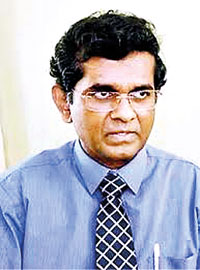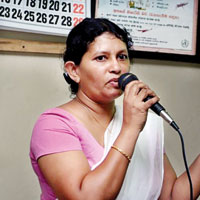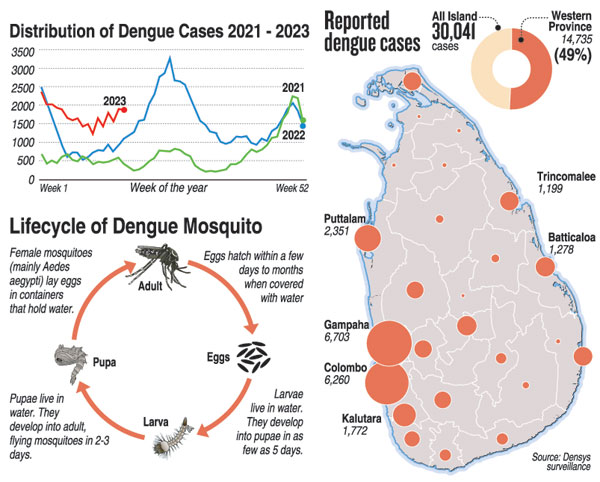News
Dengue danger on the rise
View(s):By Kumudini Hettiarachchi

Dr. Ananda Wijewickrama
“We have recorded nearly 31,000 patients since January this year of which 49% (nearly half) are in the Western Province comprising the Colombo, Gampaha and Kalutara districts,” said Consultant Community Physician Dr. Nimalka Pannila Hetti of the National Dengue Control Unit, stressing that 25% of these cases are reported from among children in the age-group 4-19 years.The Sunday Times on April 30 exclusively reported the likely out-of-pattern spread of dengue as well as data of a country-wide survey in an article headlined: First-ever dengue ‘census’ in SL yields valuable data.
Dr. Pannila Hetti urged everyone to check out all breeding spots and clear them, while explaining that people who needed to be vigilant most were those at construction sites, government institutions, places of religious worship and schools.

Dr. Nimalka Pannila Hetti
As unattended concrete slabs are danger zones with stagnant water, the Dengue Control Unit has requested that larvicide be applied to prevent mosquito breeding. This is because three stages (egg, larva and pupa) of the four-stage lifecycle of the mosquito is in water.
It has also carried out awareness programmes among construction workers and requested them to spend at least half-an-hour per week as the mosquitoe’s lifecycle is one week, to search for water collection places and clear them up.
“Even inside and outside our homes and our neighbourhoods, look closely to identify breeding spots and destroy them,” she said.
A ‘Mosquito Prevention Week’ had been declared from April 26 to May 2 in the Western Province, with the support of the Governor, the Chief Secretary, the Provincial Director of Health Services and the Dengue Control Unit.
“We went to many construction sites and offices during working days and homes during the weekend,” said Dr. Pannila Hetti.

Dengue ward at NIID full up. Pic by Akila Jayawardena
The action needed in the light of showers which are harbingers of the spread of dengue, according to Dr. Pannila Hetti is:
- Mosquito source reduction through the destruction of breeding sites and larvae
- Indoor fogging as the World Health Organization (WHO) has stated that outdoor fogging is not very effective
- Protecting oneself from mosquito bites by wearing long sleeved clothing and keeping the exposure areas for bites minimal and also applying solutions like citronella oil and other health-approved solutions to prevent bites
- If a person comes down with fever, suspect that it could be dengue and seek medical advice. Don’t self-medicate or resort to so-called instant cures being touted on social media
She said that everyone should get into action now, otherwise the spread of dengue would worsen as the weeks go by because for the mosquito to breed it will take one week; for the virus to amplify within the mosquito will take another week; and for the mosquito to inject the virus to a human and for the infected person to show symptoms such as fever may take another week.
“Act now to prevent a dengue disaster in about a month,” added Dr. Pannila Hetti.

| Aggressive control and preparation for unexpectedly high peak, a must Dengue patient numbers are on the rise, which is an unusual pattern at this time of the year and the need is for “aggressive control” before it gets out of hand, confirmed a dengue expert, explaining that usually the upward trends begin around mid-May with the monsoon rains. “This year, however, we had quite a lot of patients in April,” said Senior Consultant Physician Dr. Ananda Wijewickrama of the National Institute of Infectious Diseases (NIID), Angoda. He was very concerned about what awaits Sri Lanka around June, when usually the dengue cases would peak. “Imagine to what level the peak would reach, if the base from which it starts to shoot up is already high unlike in other years. This was the situation we faced in 2017 due to DEN-2 (the second serotype of four – DEN-1, DEN-2, DEN-3 and DEN-4) with a flood of patients. This time round, it is DEN-3,” said this clinician. The strong measures to control the dengue situation includes being prepared to meet a high-case dengue contingency in June, stressed Dr. Wijewickrama. “We need to be ready to perform basic investigations such as full blood counts (FBCs) for which reagents should be accessible. If people are very ill, clinicians need to have access to liver function tests and also blood clotting tests and medicines such as dextran,” he added.
| |
The best way to say that you found the home of your dreams is by finding it on Hitad.lk. We have listings for apartments for sale or rent in Sri Lanka, no matter what locale you're looking for! Whether you live in Colombo, Galle, Kandy, Matara, Jaffna and more - we've got them all!

